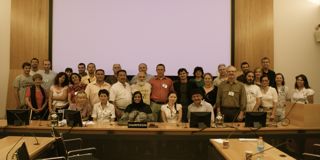
14 July 2010 | Interviews | CSO Regional Consultation for Land and Natural Resource Tenure | Food Sovereignty
Providing solutions
Interview with Antonio Onorati. A balance of the SCO meeting in Rome
Download: MP3 (2.2 Mb)
Real World Radio interviewed Antonio Onorati, representative of the International Committee for Food Sovereignty. He participated in the Regional Consultation of Civil Society Organizations of Europe, Central and West Asia on the FAO’s Voluntary Guidelines on Land Tenure, held in Rome.
He made a balance of the positive and negative aspects of the consultation and highlighted what areas we should focus our work on, and the issues that will be addressed in the short and long term.
Firstly, he said that one of the positive aspects was that there had been a discussion on a very complex issue in a very diverse region. However, they looked for similarities to draw a common strategy.
The second positive aspect was that besides being a consultation, the meeting had been a training opportunity for social organizations.
Thirdly, he mentioned that discussing the guidelines had also implied some political aspects, as whether they should be voluntary or compulsory, or if it would be useful to engage in an institutional process, which for him implied some aspects of the long-term strategy to be discussed as broadly as
possible.
About the negative aspect, he made reference to the difficulty of addressing issues that demanded a radical response by submitting alternatives within an institutional context. He spoke of the need to propose specific solutions, like creating a legal framework with a totally different approach: he mentioned collective rights and a production model alternative to the industrial one.
This, which is already being applied by some movements, should be on the table as a fact that should be respected by the governments, he said.
He also highlighted that great part of the planet is under military occupation, as a result of conflicts over land tenure. Onorati said that it is necessary to work more on this area, and to propose specific actions that go beyond the solidarity towards the occupied peoples.
One example of this is the occupation of lands, so that they remain in the hands of peasants.
Onorati also referred to the presence of representatives of the governments of the Netherlands, the US, Brazil, Egypt, Syria and Iraq on the last day of the consultation, and said that there should be a political assessment of the fact that they attended the meeting and also how the organizations would influence on the public decision-making processes.
He said that special attention should be paid to the fact that representatives of Arabic governments were present at the meeting.
He added that how to influence on the policies of the governments depend on the civil society mobilization, because it is not the good arguments what is going to convince the governments but the strength behind them.
“The force in the streets should be turned into an organization, into specific proposals and to advocate for those proposals by sticking to them. We have to reinforce the participation processes”, concluded Onorati.
Photo: Real World Radio








